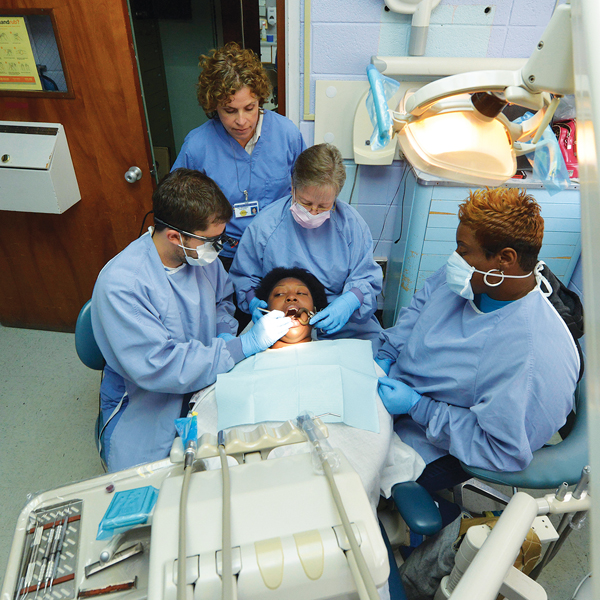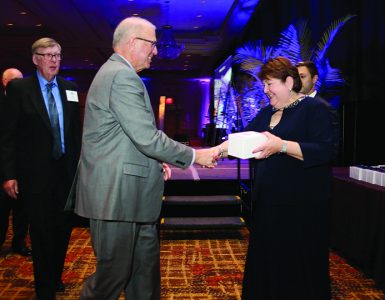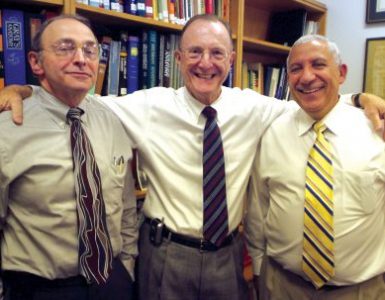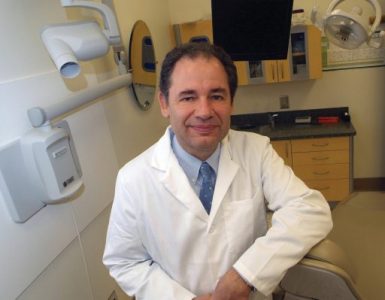Gracewood Rotation Broadens Perspective for Seniors
Editor’s note: This is the first in a series of Word of Mouth articles highlighting community-based dental rotation sites for seniors.
Dr. Kim Willingham (’90) didn’t specifically seek out a challenge serving the developmentally disabled, but the role has proven to be a remarkably good fit.
Meeting the Need
“I really enjoy it,” says Willingham, Dental Director of the East Central Regional Hospital’s Gracewood campus. “It’s very challenging. Every day is different and every individual is different. It challenges you to do the best dentistry you can with the resources at hand.”
The patients, all adults, have disabilities ranging from autism to cerebral palsy. Some are profoundly mentally retarded and lack the ability to communicate – a particular challenge for the College of Dental Medicine seniors who rotate through the clinic.
“Some of the patients can’t communicate pain or discomfort,” says Willingham. “They can’t talk to you. Some are scared, and some just don’t understand what’s going on. Not only are we concerned about their dental needs, but we have to manage a lot of behavioral issues, too. What I try to get across to the dental students is that these individuals are people. They have needs, and part of our responsibility
as dentists is to meet those needs.” Says Dr. Eliza Myers (’09), the clinic’s other full-time dentist, “I feel God has called me to work here. It’s always very rewarding and challenging. I have a very high patience level, and that’s usually all it takes to work with this population: just more time and patience. A little TLC goes a long way.”
A Little TLC
And she emphasizes that the TLC is reciprocated in spades. “When I was pregnant with my first baby (now age 3), lots of my patients made me cards,” says Myers, who at press time was expecting her second child any day. “I still have them in my baby book. I’ve formed very tight connections.”
The clinic also enables the students to see a stellar example of teamwork. “This is definitely a team approach to dentistry,” saysWillingham, who joined the clinic three years ago when invited by a colleague to fill a part-time position
that quickly morphed into full time. “Sometimes, I’ll have three other staffers in the room with me. You have to have a compassionate, patient, and understanding team to do this work. I couldn’t do it without them.”
Many of the staff members have decades-long tenure, attesting to the dentists’ observation that this population is hard to walk away from. “You see these people living day to day with significant challenges,” Willingham says. “I have great admiration for them.” The students quickly grow to share her awe.
“It has been valuable to be exposed to patients with severe mental health issues as well as profound disabilities,” says Jeremy Edwards, a dental student from Snellville, Ga., who completed the rotation in the fall. “This has broadened my horizons not just in dentistry but for life in general. Seeing these types of patients increases awareness and cultivates compassion.”
Paradigm Shift
Dr. Ron Fields, who completed the rotation last year and is now completing a pediatric dental residency at GRU, concurs. “As a student who wanted to pursue a career in pediatrics, a specialty that treats those with special needs as well as children, I felt the experience would benefit my education,” he says. “Not only was the rotation useful, it was a unique experience and a window into an area of medicine and dentistry that many never have an opportunity to be part of.”
He also relished the multidisciplinary aspect of the experience. “I was able to observe coordination between different medical and dental specialties,” Fields says. “The patients’ extremely complex medical histories required close coordination with their patient’s primary care physicians as well as other specialists.
Says Willingham, “I think the experience is a bit of a ‘wow.’ The students come away with a greater appreciation of the special-needs population and the people who work with them.”
Fields couldn’t agree more. “The patients were special and the treatment was needed,” he says. “The way the staff and doctors treated and befriended their patients touched my heart and created a paradigm shift within myself.” “It’s not for everybody,” Myers acknowledges, “but if even two out of 10 students who rotate through our clinic see the value in it, we’ve done our job.”
Individualized Treatment
The dentists also cite the advantage of being able to focus solely on patient care. “In public health,” says Willingham, “a lot of the worries about the business side of dentistry are eliminated. We’re just there to do what’s best for the patient. I like that.”
“Many of these patients were not always cognizant of the fact that we were providing a service that was helpful to them. Having the confidence to treat them was a challenge in the beginning but turned into a great experience. I was forced to gain confidence in my treatment plan and treatment techniques.” –DR. RON FIELDS
Of course, the students also see the challenges of working with aspecial-needs population firsthand. “I think a lot of their initial reaction is, ‘This is a lot harder than I thought it would be,’” says Willingham. “Some of the patients are almost moving targets most of the time. It can be unpredictable; you have to read behaviors. Treatment plans are a lot more individualized for these patients than for others.”
Says Fields, “Many of these patients were not always cognizant of the fact that we were providing a service that was helpful to them. Having the confidence to treat them was a challenge in the beginning but turned into a great experience. I was forced to gain confidence in my treatment plan and treatment techniques.”
The students also cited the advantage of seeing up close the challenges of limited funding in public health. “The clinic operates within a fairly limited budget,” Edwards says, “and this causes the dental team to make decisions for their patients that may not always be the most optimal treatment.”
Myers agrees. “I wish the clinic had more funding. Our resources are definitely limited, but we are able to do pretty comprehensive care with what we’re given.”
She and Willingham are glad the students see the issue up close. “One of my main goals is that they become advocates for public service,” Willingham says.
A Great Resource
Willingham and Myers are immeasurably grateful that the College of Dental Medicine sharestheir priorities. “The opportunity to have students here has been hugely beneficial,” Willingham says. “The College of Dental Medicine is such a great resource. The faculty is always so accommodating. They understand the importance; even students who don’t go into public health will probably see this type of patient in the future. I wish every student had this experience.”
Edwards is glad he did. “It has been an honor to deliver care to these patients,” he says. “They all deserve the best care we can give them.”










